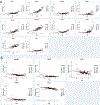Comprehensive Genomic Landscapes in Early and Later Onset Colorectal Cancer
- PMID: 31243121
- PMCID: PMC6774873
- DOI: 10.1158/1078-0432.CCR-19-0899
Comprehensive Genomic Landscapes in Early and Later Onset Colorectal Cancer
Abstract
Purpose: The incidence rates of colorectal cancers are increasing in young adults. The objective of this study was to investigate genomic differences between tumor samples collected from younger and older patients with colorectal cancer.
Experimental design: DNA was extracted from 18,218 clinical specimens, followed by hybridization capture of 3,769 exons from 403 cancer-related genes and 47 introns of 19 genes commonly rearranged in cancer. Genomic alterations (GA) were determined, and association with patient age and microsatellite stable/microsatellite instability high (MSS/MSI-H) status established.
Results: Overall genomic alteration rates in the younger (<40) and older (≥50) cohorts were similar in the majority of the genes analyzed. Gene alteration rates in the microsatellite stable (MSS) younger and older cohorts were largely similar, with several notable differences. In particular, TP53 (FDR < 0.01) and CTNNB1 (FDR = 0.01) alterations were more common in younger patients with colorectal cancer, and APC (FDR < 0.01), KRAS (FDR < 0.01), BRAF (FDR < 0.01), and FAM123B (FDR < 0.01) were more commonly altered in older patients with colorectal cancer. In the MSI-H cohort, the majority of genes showed similar rate of alterations in all age groups, but with significant differences seen in APC (FDR < 0.01), BRAF (FDR < 0.01), and KRAS (FDR < 0.01).
Conclusions: Tumors from younger and older patients with colorectal cancer demonstrated similar overall rates of genomic alteration. However, differences were noted in several genes relevant to biology and response to therapy. Further study will need to be conducted to determine whether the differences in gene alteration rates can be leveraged to provide personalized therapies for young patients with early-onset sporadic colorectal cancer.
©2019 American Association for Cancer Research.
Conflict of interest statement
Figures





References
Publication types
MeSH terms
Substances
Grants and funding
LinkOut - more resources
Full Text Sources
Medical
Research Materials
Miscellaneous

